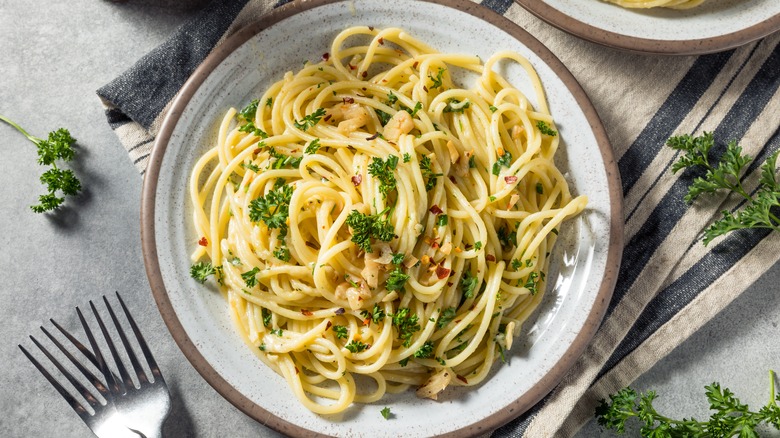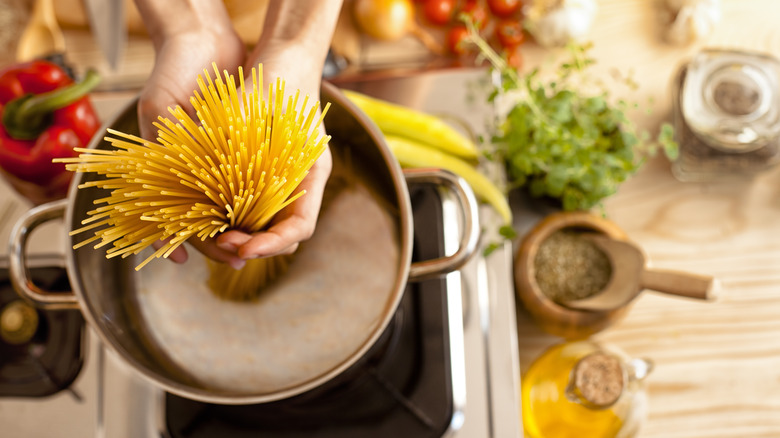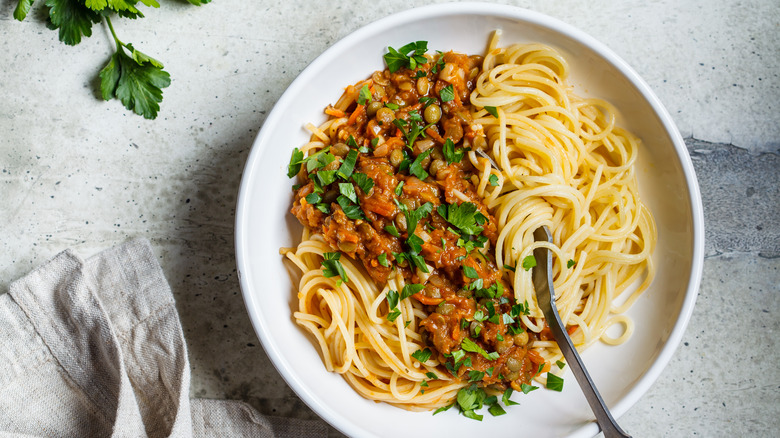Is Pasta Considered A Vegan-Friendly Food?
When the subject of veganism comes up, there's one common refrain: "I would try it, but I could never give up [insert food here]." People may care deeply about the environment and animal welfare, but changing your diet can be an overwhelming prospect for some, especially if they have to give up their favorite foods.
Maybe you're flirting with the idea of a plant-based diet, or you just have a vegan friend or two coming over for dinner. Either way, you'll be relieved to know that one of the most versatile, crowd-pleasing ingredients out there — Italian pasta — is usually vegan. Spaghetti with store-bought marinara is arguably the easiest dinner of all time, and it's even better when you know you don't have to give it up when you're both starving and starved for time, while still following a plant-based diet.
However, it should go without saying that pasta brands and recipes differ. Dried pasta is typically vegan, but fresh pasta usually isn't, as almost all recipes contain eggs. Likewise, pastas labeled as "egg noodles" aren't vegan, either (unless it's a vegan product imitatating egg noodles, of course). There's also the matter of what you're putting on the pasta. A basic tomato sauce is usually a good bet, but be sure to check the ingredients. Many of the jars you see on shelves are not going to be vegan-friendly — milk, and butter; meaty ingredients like bacon, pancetta, or lard; and even honey could be hiding in ingredient lists.
Why dry pasta is a safe bet for vegans
For most of us, dry pasta — the shelf-stable kind that comes in boxes — is probably the most familiar form we cook with. The fact that boxed pasta won't go bad for a long time, and that it usually costs just a couple of dollars, makes it an invaluable pantry staple. Dry pasta (which Italians call pasta secca) is typically made from just wheat with a few added nutrients. It's always worth checking the label if you're buying a new-to-you product, but you'll find that the most common dry pasta brands don't contain eggs, butter, or any non-vegan ingredients.
Fresh pasta, however, is by and large going to be off-limits for vegans. Pasta can be made using just wheat, but in the vast majority of recipes and restaurant kitchens, it's also going to be made with eggs for richness and tenderness. If you're eating out, restaurant menus will usually state it explicitly if they make their pasta fresh, since it's a selling point, but when in doubt, you can always ask your server if an item is vegan.
Getting sauced
Things get more self-explanatory when we're talking about sauce — you can probably guess, for instance, that creamy Alfredo sauce and meaty Bolognese aren't vegan. Some brands, however, are starting to sell vegan versions of these non-vegan favorites, so keep your eyes peeled in the sauce aisle if you're curious to try one. Alternatively, you could always try making one of the many recipes you can find online for veganized Italian dishes, using plant-based ingredients like cashew cream to sub in for dairy. Plant-based ground beef or lentils can even take the place of meat.
For a quick weekday meal, jarred sauce is still very much an option. Most simple tomato-based sauces are made of just tomatoes, garlic and onions, oil, and seasonings. The only caveat is that many of these sauces contain cheese for flavor, so always double-check the ingredients, or look for useful symbols and labels that indicate a product is vegan. There are plenty of options, and you'll have an arsenal of favorite vegan-friendly standbys in no time.


